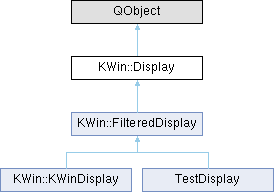Class holding the Wayland server display loop.
More...
#include <display.h>
Class holding the Wayland server display loop.
- Todo
- Improve documentation
Definition at line 33 of file display.h.
◆ Display()
| KWin::Display::Display |
( |
QObject * | parent = nullptr | ) |
|
|
explicit |
◆ ~Display()
| KWin::Display::~Display |
( |
| ) |
|
|
virtual |
◆ addSocketFileDescriptor()
| bool KWin::Display::addSocketFileDescriptor |
( |
int | fileDescriptor, |
|
|
const QString & | socketName = QString() ) |
Adds a socket with the given fileDescriptor to the Wayland display. This function returns true if the socket has been added successfully; otherwise returns false.
The compositor can call this function even after the display has been started.
- socketName can optionally be parsed to store the socket name represented by the given file-descriptor
- See also
- start()
Definition at line 56 of file display.cpp.
◆ addSocketName()
| bool KWin::Display::addSocketName |
( |
const QString & | name = QString() | ) |
|
Adds a UNIX socket with the specified name to the Wayland display. This function returns true if the socket has been added successfully; otherwise returns false.
If the specified socket name name is empty, the display will pick a free socket with a filename "wayland-%d".
The compositor can call this function even after the display has been started.
- See also
- start()
Definition at line 68 of file display.cpp.
◆ bufferForResource()
| GraphicsBuffer * KWin::Display::bufferForResource |
( |
wl_resource * | resource | ) |
|
|
static |
Returns the graphics buffer for the given resource, or null if there's no buffer.
Definition at line 239 of file display.cpp.
◆ clientConnected
◆ clientDisconnected
◆ connections()
◆ createClient()
Create a client for the given file descriptor.
The client is created as if it connected through the normal server socket. This method can be used to create a connection bypassing the normal socket connection. It's recommended to use together with socketpair and pass the other side of the socket to the client.
- Parameters
-
| fd | The file descriptor for the socket to the client |
- Returns
- The new ClientConnection or
null on failure.
Definition at line 228 of file display.cpp.
◆ createShm()
| void KWin::Display::createShm |
( |
| ) |
|
◆ dispatchEvents()
| void KWin::Display::dispatchEvents |
( |
| ) |
|
◆ getConnection()
◆ isRunning()
| bool KWin::Display::isRunning |
( |
| ) |
const |
◆ largestIntersectingOutput()
| OutputInterface * KWin::Display::largestIntersectingOutput |
( |
const QRect & | rect | ) |
const |
◆ nextSerial()
| quint32 KWin::Display::nextSerial |
( |
| ) |
|
◆ operator wl_display *() [1/2]
| KWin::Display::operator wl_display * |
( |
| ) |
|
◆ operator wl_display *() [2/2]
| KWin::Display::operator wl_display * |
( |
| ) |
const |
◆ outputDevices()
◆ outputs()
◆ outputsIntersecting()
| QList< OutputInterface * > KWin::Display::outputsIntersecting |
( |
const QRect & | rect | ) |
const |
◆ runningChanged
| void KWin::Display::runningChanged |
( |
bool | | ) |
|
|
signal |
◆ seats()
◆ serial()
| quint32 KWin::Display::serial |
( |
| ) |
|
◆ socketNames()
| QStringList KWin::Display::socketNames |
( |
| ) |
const |
Returns the list of socket names that the display listens for client connections.
Definition at line 87 of file display.cpp.
◆ socketNamesChanged
| void KWin::Display::socketNamesChanged |
( |
| ) |
|
|
signal |
◆ start()
| bool KWin::Display::start |
( |
| ) |
|
Start accepting client connections. If the display has started successfully, this function returns true; otherwise false is returned.
Definition at line 92 of file display.cpp.
◆ DisplayPrivate
◆ running
| bool KWin::Display::running |
|
read |
The documentation for this class was generated from the following files:
